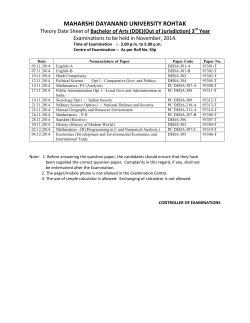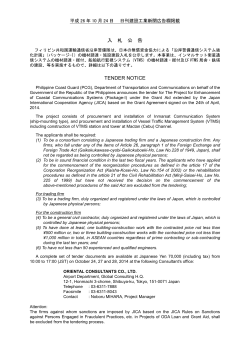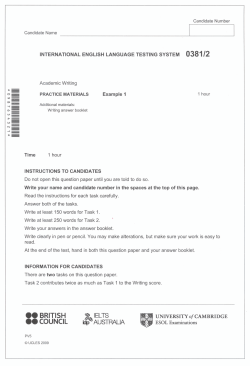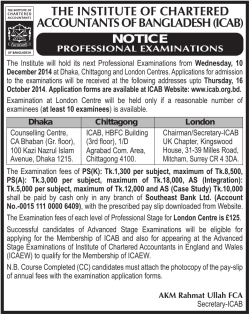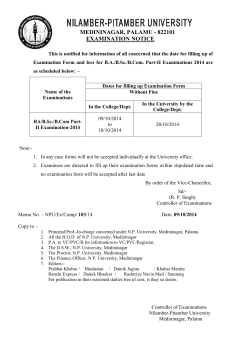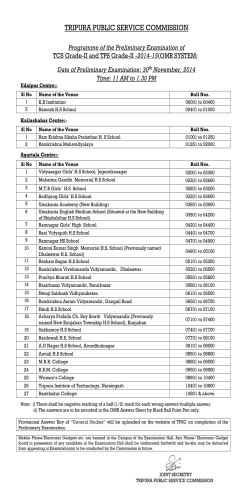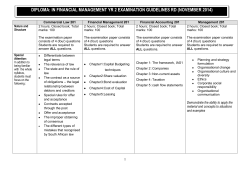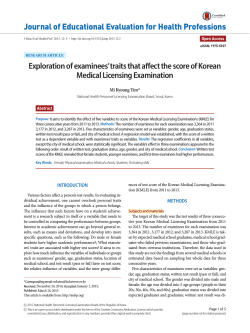
outline of results 2014 EJU 2nd session
Outline of Results 2014 Examination for Japanese University Admission for International Students (2nd Session) Contents 1. Guidelines for the 2014 Examination for Japanese University Admission for International Students (EJU) 2. Examination Details 3. List of Average Scores by Subject 4. Score Distribution 5. Cumulative Distribution of Scaled Score 1 3 7 8 11 Japan Student Services Organization (JASSO) Guidelines for the 2014 Examination for Japanese University Admission for International Students (EJU) 1. Purpose This examination is used to evaluate the Japanese language proficiency and the basic academic abilities of international students who wish to study at the undergraduate level at universities or other such higher educational institutions in Japan. 2. Examination Administrator The Japan Student Services Organization administers the examination with the cooperation of the Ministry of Education, Culture, Sports, Science and Technology, the Ministry of Foreign Affairs, Japanese universities, and affiliated institutions in Japan and overseas. 3. General Description of the Examination (1) Eligibility: International students who wish to study at the undergraduate level at universities or other such higher educational institutions in Japan. (2) Date of exam: 1st Session June 15, 2014 (Sunday) 2nd Session November 9, 2014 (Sunday) (3) Venues: Japan: Hokkaido, Miyagi or Yamagata, Gunma, Saitama, Chiba, Tokyo, Kanagawa, Toyama or Ishikawa, Shizuoka, Aichi, Kyoto, Osaka, Hyogo, Okayama or Hiroshima, Fukuoka and Okinawa. Outside Japan: Hong Kong, India (New Delhi), Indonesia (Jakarta and Surabaya), Malaysia (Kuala Lumpur), Mongolia (Ulaanbaatar), Myanmar (Yangon), Philippines (Manila), Republic of Korea (Seoul and Busan), Russia (Vladivostok), Singapore, Sri Lanka (Colombo), Taiwan (Taipei), Thailand (Bangkok) and Vietnam (Hanoi and Ho Chi Minh City) (4) Subjects: Depending on the university they wish to enter and the course of study they wish to pursue, the examinees select the subject tests that they will take from the following. Subject Purpose Length Score Range reading comprehension, Japanese as a Foreign Language listening and listening-reading comprehension Measurement of the Japanese language skills (academic Japanese) required for studying at Japanese universities. 125 minutes 0-400 Writing 0-50 Measurement of the basic academic skills in science (Physics, Science Chemistry, and Biology) necessary for studying in a science department of a Japanese university. Japan and the World Mathematics Measurement of the basic academic skills in liberal arts, particularly thinking and logical abilities, necessary for studying at Japanese universities. Measurement of the basic academic skills in mathematics necessary for studying at Japanese universities. 80 minutes 80 minutes 80 minutes 0-200 0-200 0-200 [Remarks] a) The test in Japanese as a Foreign Language consists of writing, reading comprehension, and listening and listening-reading comprehension. b) In the science test, examinees select two subjects from physics, chemistry and biology depending on the requirements of the university they wish to enter and the course of study they wish to pursue. c) In the mathematics test, examinees select either of Course 1 if they plan to enter liberal arts programs or science programs requiring comparatively less knowledge of mathematics, or Course 2 if they plan to enter programs requiring advanced knowledge of mathematics depending on the requirements of the university they wish to enter and the course of study they wish to pursue. d) Examinees may not choose to take both the Science test and the Japan and the World test. e) The score ranges listed are not raw scores except the writing in Japanese as a foreign language; instead, they are based on a common scale. The writing is scored based on the standards. f) Refer to the syllabuses for each subject. (5) Examination languages option: The EJU is available in Japanese or English, except for the Japanese as a Foreign Language test, which is given in Japanese only, applicants need to indicate their preference in the application depending on the requirements of the university they wish to enter and the course of study they wish to pursue. (6) Answering format: All questions use a multiple-choice format, except for the writing section of the Japanese as a Foreign Language test. 1 4. Application Procedures, etc. (1) Application Procedure a) Application form: As prescribed b) Examination fee: Japan Outside Japan c) Application period: Japan d) Applications: Outside Japan Japan Outside Japan One subject: JPY 6,130 (including tax) Two or three subjects: JPY12,260 (including tax) Hong Kong One subject HKD 400 Two or three subjects HKD 750 India INR 800 Indonesia IDR 50,000 Malaysia MYR 60 Mongolia MNT 10,000 Myanmar USD 15 Philippines PHP 250 Republic of Korea One subject KRW 40,000 Two or three subjects KRW 65,000 Russia RUB 300 Singapore SGD 36 Sri Lanka LKR 700 Taiwan One subject TWD 1,200 Two or three subjects TWD 1,600 Thailand THB 300 Vietnam VTD 100,000 1st Session: From February 10 (Monday) to March 7 (Friday), 2014 (The application must be postmarked by March 7.) 2nd Session: From June 30 (Monday) to July 25 (Friday), 2014 (The application must be postmarked by July 25.) Same as in Japan The applications should be submitted to the Testing Division, Student Exchange Department, Japan Student Services Organization. The applications should be submitted to the Overseas Representatives in each country or region. (2) EJU Bulletin The details of the application procedure and other information will be released in the "Bulletin of the 2014 Examination for Japanese University Admission for International Students (EJU)". Bulletin Vendors: Japan The bulletin is scheduled to go on sale at major bookstores throughout Japan on February 10, 2014 (Monday). The price is ¥486 per copy not including consumption tax. Outside Japan To be decided through consultation with the Overseas Representative in each country or region. (3) Sending of Examination Voucher Japan Examination vouchers will be sent on the following dates (tentative) in response to applications received. 1st Session May 16, 2014 (Friday) 2nd Session October 17, 2014 (Friday) Outside Japan To be decided through consultation with the Overseas Representative in each country or region. [Remarks]Postage charges for examination voucher and score report will be announced in the Guidelines for EJU, etc. 5. Score Report and Notification (1) Score Reports to Examinees Score reports will be sent to examinees on the following dates (tentative). 1st Session July 18, 2014 (Friday) 2nd Session December 16, 2014 (Tuesday) (2) Notification to Universities JASSO will begin responding to score inquiries from universities in late July 2014 for the 1st Session, and late December 2014 for the 2nd Session. Inquires: Japan Student Services Organization Student Exchange Department, Testing Division 4-5-29 Komaba, Meguro-ku, Tokyo 153-8503 Japan Telephone: 03-6407-7457 Fax: 03-6407-7462 E-mail: [email protected] 2 Examination Details 1. Number of applicants and examinees by site Examination Site Hokkaido Tohoku Applicants Miyagi Gunma Saitama Chiba Kanto Tokyo In Japan Kanagawa Toyama Shizuoka Aichi Kyoto Osaka Hyogo Okayama Fukuoka Chubu Kinki Chugoku Kyushu Okinawa Total in Japan Hong Kong India New Delhi Jakarta Surabaya Kuala Lumpur Ulaanbaatar Yangon Manila Seoul Indonesia Malaysia Mongolia Myanmar Philippines Outside Japan Republic of Korea Busan Russia Singapore Sri Lanka Taiwan Thailand Vladivostok Colombo Taipei Bangkok Hanoi Ho Chi Minh City Vietnam Total outside Japan Grand total Examinees 65 274 92 514 589 8,088 354 62 272 1,077 841 1,567 280 440 2,250 39 16,804 140 133 220 58 157 95 2 20 1,143 349 12 16 86 275 142 94 32 57 256 81 411 474 6,697 290 58 230 944 754 1,349 231 385 1,940 38 14,195 118 81 148 32 152 65 2 7 906 289 6 14 32 223 86 70 32 2,974 2,263 19,778 16,458 Note: The number of applicants and examinees who selected the English version of EJU are as follows. Applicants In Japan Outside Japan Total 578 727 1,305 Examinees 492 454 946 3 Reference: JASSO has approved the following testing accommodations (special arrangements) for applicants requesting their use for reasons of disability, injury or other valid grounds. Number of applicants requesting testing accommodations: 2 (1 in Japan, 1 overseas) Description of Approved Testing Accommodations Exam Time Extension Total blindness 1 Reading (40min→60 min. / +50%) Total blindness 1 Total blindness 1 Question in braille Total blindness 1 Answer in braille Total blindness 1 Hard of hearing 1 (55min→77 min) and Question Method Answer Sheet and Answer Method Use of Hearing Assistance Hearing aids Hard of hearing Testing in separate room Other Cases Writing (30min→45 min. / +50%) Listening and Listening-Reading Comprehension Question Booklet Disability Total blindness 2 Seating position considerations Hard of hearing 1 Telling notes with the document Hard of hearing 1 Total blindness 1 Use of a braillewriter * Because some applicants qualify for a multiple number of testing accommodations, the numbers listed are the combined totals. 4 2. Examination venues Name of Prefecture Name of Examination Venue Hokkaido Hokkaido University Sapporo Campus Miyagi Tohoku University Kawauchi-Kita Campus Gunma* Takasaki University of Commerce Saitama* Saitama University Chiba* Chiba University Nishi-Chiba Campus Kokushikan University Setagaya Campus Tokyo The University of Tokyo Komaba Campus Waseda University Waseda Campus Kanagawa* Yokohama National University Tokiwadai Campus Toyama* University of Toyama Gofuku Campus Shizuoka Nihon University College of International Relations Mishima Campus Aichi Seijoh University Kyoto* Doshisha University Kyotanabe Campus Osaka Osaka University Toyonaka Campus Hyogo* University of Hyogo Himeji Campus for Engineering Okayama Okayama University Tsushima Campus Fukuoka Kyushu Kyoritsu University Okinawa University of the Ryukyus Senbaru Campus * An examination language "English" was not available. Country and Region Hong Kong India Indonesia Malaysia Mongolia Myanmar Philippines Republic of Korea City New Delhi Jakarta Surabaya Kuala Lumpur Ulaanbaatar Yangon Manila Seoul Name of Examination Venue Wai Kiu College Sri Venkateswara College, Delhi Depok Campus, University of Indonesia SMA Negeri 5 Surabaya Confucian Private Secondary School Mongolia-Japan Center Myanmar Association of Japan Alumni (MAJA) De La Salle-College of Saint Benilde Yeouido Middle School Yeouido Girls' High School Busan Gyeongnam Technical High School Russia Vladivostok Far Eastern Federal University Singapore Sri Lanka Colombo Taiwan Taipei The Japanese Cultural Society, Singapore Sri Lanka Japan Cultural Centre (Sasakawa hall) The Language Training & Testing Center Thailand Bangkok Hanoi Ho Chi Minh City Vietnam Language Center of the College of Liberal Arts, NTU Old Japan Students' Association, Thailand Foreign Trade University (Vietnam-Japan Human Resources Cooperation Center) University of Social Sciences & Humanities, Ho Chi Minh City 5 3. Number of examinees by nation/region of origin (Japan) Country / Region Examinees Country / Region Examinees China 8,962 Kyrgyzstan 2 Vietnam 2,450 Colombia 2 Nepal 911 Switzerland 2 Republic of Korea 615 New Zealand 2 Taiwan 227 Finland 2 Malaysia 130 Benin 2 Hong Kong 119 Belgium 2 Indonesia 114 Mexico 2 Myanmar 114 Morocco 2 Mongolia 88 Afghanistan 1 Saudi Arabia 79 Algeria 1 Thailand 69 Uganda 1 Sri Lanka 50 Ghana 1 Russia 29 Qatar 1 Philippines 24 Cameroon 1 Sweden 17 Guinea 1 U.S.A. 12 Cyprus 1 Bangladesh 10 Kenya 1 India 9 Congo(Kinshasa) 1 Canada 9 Syria 1 Turkey 9 Spain 1 Italy 8 Sudan 1 France 8 Tajikistan 1 Kazakhstan 7 Denmark 1 Cambodia 7 Turkmenistan 1 Singapore 7 New Caledonia 1 Uzbekistan 6 Norway 1 Ukraine 4 Bahrain 1 Senegal 4 Bulgaria 1 Pakistan 4 Bhutan 1 Brazil 4 Belarus 1 Macau 4 Portugal 1 Iran 3 South Africa 1 Australia 3 Moldova 1 Germany 3 Laos 1 Nigeria 3 Latvia 1 Peru 3 Others 21 United Kingdom 2 Total Greece 2 75 countries / Regions 6 14,195 List of Average Scores by Subject Subject Examinees (Score Range) Listening and 25 (12.5%) 29.9 (15.0%) 126.4 (63.2%) 194 (97.0%) 27 (13.5%) 39.4 (19.7%) 231.0 (57.8%) 371 (92.8%) 52 (13.0%) 65.3 (16.3%) 30.6 (61.2%) 50 (100.0%) 0 (0.0%) 12.0 (24.0%) 2,809 53.2 (53.2%) 95 (95.0%) 23 (23.0%) 14.8 (14.8%) 3,146 52.9 (52.9%) 96 (96.0%) 21 (21.0%) 15.3 (15.3%) 945 61.3 (61.3%) 94 (94.0%) 22 (22.0%) 15.0 (15.0%) 6,878 120.7 (60.4%) 199 (99.5%) 9 (4.5%) 38.1 (19.1%) 6,264 103.4 (51.7%) 180 (90.0%) 50 (25.0%) 23.7 (11.9%) 3,085 114.4 (57.2%) 199 (99.5%) 60 (30.0%) 26.2 (13.1%) Reading (0-200) Language 16, 127 Total (0-400) Writing (0-50) Physics (0-100) Chemistry Science (0-100) Biology (0-100) Japan and the World (0-200) Course 1 (0-200) Standard Dev. 177 (88.5%) Reading (0-200) a Foreign Lowest Score 104.5 (52.3%) Listening- Japanese as Average Score Highest Score Mathematics Course 2 (0-200) Note: Percentages of Average Score, Highest Score, Lowest Score and Standard Dev. indicate the ratio to a perfect score. 7 Score Distribution 8 9 10 Cumulative Distribution of Scaled Score 11 The cumulative distribution of the total score displayed above indicates at which position the score achieved by an examinee stands in the total rankings. Taking the example of an examinee whose total score is 240 from the two fields of the test of Japanese as a Foreign Language, “240” on the horizontal axis corresponds to “70%” on the vertical axis (ranking). This means that the number of examinees who are below this examinee occupies 70 % of the total examinees. Therefore, the percentile rank of this examinee is “70”. The percentile ranking allows you to relatively compare your score, i.e. showing the position of the examinee in the entire group who took the examination. 12 13
© Copyright 2026
